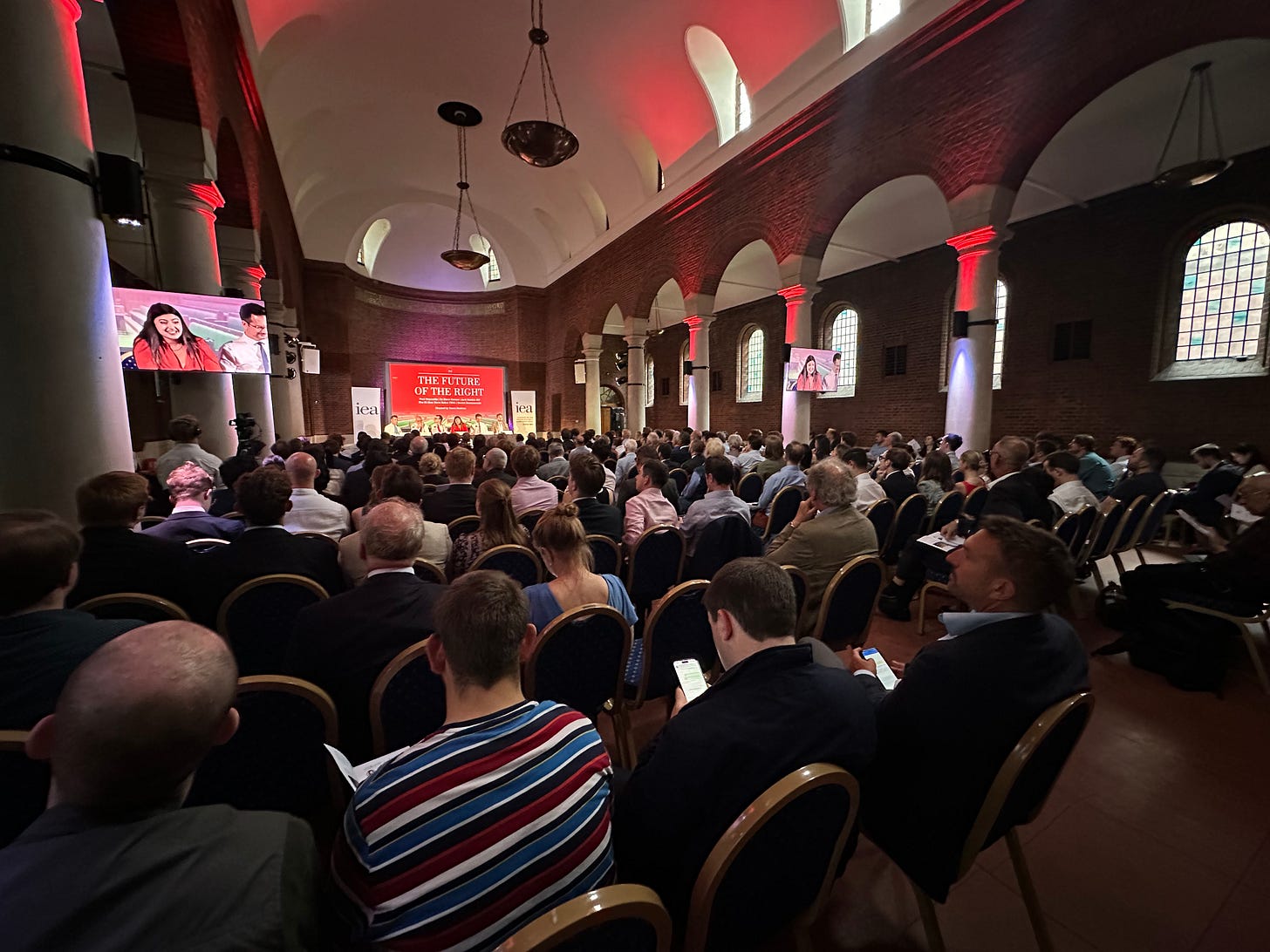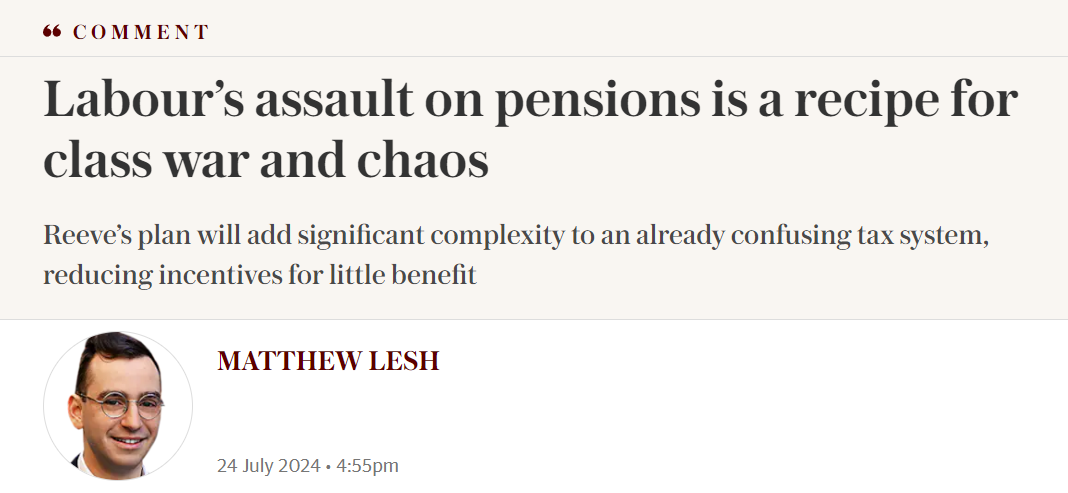Tax rises are on the way
Ministers 'discover' a black hole in the public finances
To nobody’s great surprise (and fairly widespread derision) the government has ‘discovered’ a black hole in the public finances, which is likely to be filled by tax increases announced at their first budget this Autumn.
There are enough arcane specifics the government can point to that they will get away with the obvious deception. But let’s be clear: spending pressures were well-understood before the election and some people (notably at the IFS) were very forthright about them during the campaign.
Needless to say, I don’t care much for tax increases –especially when the overall burden is at an historic high, and set to climb further as frozen thresholds continue to bite. Of course, I am not in favour of structural deficits either, and recognise the impact that an ageing population is going to have on our fiscal position – unless we are willing to countenance quite radical reforms.
Let’s stress the word reform there: ‘starving the beast’ is a good short-term tactic, but unless you are prepared to change what the state does and how it does it, spending (and taxes) are only heading in one direction. We never really saw a reformist ‘phase II’ to post-2010 austerity, and it shows – both in the run-down nature of public services (even ones that classical liberals regard as essential) and the composition of parliament.
Now, I do not accept that tax rises are necessary and inevitable. There are other options. But for the sake of argument, let’s accept that taxes will go up in the short term. From a free market perspective, what is the least-worst way to do it?
Begin with property taxes: taxes on unimproved land values can be efficient and generate a modest amount of revenue. Yet we’re not starting from scratch. We already have a property tax system that raises a lot of revenue by international standards – it just does it in a very economically damaging way. We could scrap existing property taxes, replace them with some kind of land value tax, and probably collect a bit more revenue at much-reduced economic cost. It wouldn’t be much, but it would be a start.
Next stop, taxes that reflect use of an unpriced scarce resource, or otherwise internalise some negative externality. The main options here are a dynamic system of road pricing, to replace fuel duties and other motoring taxes, and a comprehensive upstream carbon tax, which could replace a whole host of other taxes and regulatory interventions. As with property taxes, these changes might net you a bit more revenue at lower economic cost – but again will only take you so far.
If you need serious money, there’s only one sensible option: reforming VAT. We currently have an exceptionally narrow VAT base by international standards, thanks to a panoply of exemptions and reduced rates. By broadening the tax base you could potentially raise tens of billions of pounds in revenue, even while lowering the tax rate. In doing so, you would dramatically improve the structure of the tax system.
It isn’t quite that easy, of course. Higher taxes are still bad for growth and living standards, even if some options are better than others. Moreover, VAT reform is likely to be subject to major political attack because it is seen as regressive. Such criticisms are wrong-headed – that a particular tax is regressive doesn’t matter if the system as a whole leans the other way; and a narrow VAT base is a wildly inefficient way to help the needy – but experience suggests they would be salient.
Nevertheless, once you move beyond these categories of taxation, you are bound to be talking about things that will have a significant and negative growth impact. Taxing income and profits is bad news unless you give full tax relief for saving and investment. Levying taxes directly on capital is even worse.
Unfortunately, this is exactly the direction that things are likely to go. Having ruled out increasing the main, broad-based taxes on earnings and consumption, the government is bound to pursue higher taxes on personal savings and investments and specific, soft-target industries.
As so often happens, political logic and economics point in opposite directions.
Tom Clougherty
Executive Director & Ralph Harris Fellow
An Introduction to Taxation
New IEA primer explains the economics and ethics at the heart of of the tax system.
Taxation may be necessary to fund public services, but policymakers must consider its moral and economic costs.
Most taxes are overly complex, politically skewed, and often cause more economic harm than good.
Corporation and capital gains taxes are the most damaging, followed by transaction (like Stamp Duty), income and payroll taxes.
Broad-based consumption and land taxes, followed by co-payments and Pigovian taxes, are the least damaging.
Tax reform and reductions require restraining government spending.
Inheritance tax raid ‘goes against human nature’, author and Adam Smith Institute Director Eamonn Butler, The Daily Telegraph, The Spectator and CapX
The great realignment continues
This week, we hosted a panel discussion on the future direction of the right after this month’s general election. The panel, chaired by Communications Officer Reem Ibrahim, addressed a wide range of debates – from tax and monetary policy to the core principles the right should embrace amid a historic ideological realignment.
So what exactly does the ideological realignment of politics look like and why does it matter? After participating in the panel discussion, Senior Education Fellow Dr Steve Davies wrote for IEA Insider and joined Director of Public Policy & Communications Matthew Lesh and Communications Manager Harrison Griffiths on this week’s IEA Podcast to discuss it further.
The best way to support our vital research and educational programmes is to become a paid IEA Insider. For a limited time, new paid subscribers will receive a copy of Steve Davies’ new book Apocalypse Next: The Economics of Global Catastrophic Risks) and a 15% discount.
News, Views & Upcoming Events
Assault on pensions is a recipe for class war and chaos, Matthew Lesh, Daily Telegraph
Will Bank of England finally cut interest rates next month?, Economics Fellow Andrew Lilico quoted in The Daily Mirror
Ukrainian Renaissance conference in Lviv
IEA Managing Editor Daniel Freeman was in Ukraine last week to attend the Ukrainian Renaissance conference, hosted by Students for Liberty, Ukrainian Students for Freedom, and the Liberální Institut. Daniel spoke at a panel discussion on how best to tackle the increasingly global Russian threat.
The Essential Scholars
Over the last year, the IEA has been working with the Canadian Fraser Institute, American Foundation of Economic Education, and Australian Institute for Public Affairs to promote the Essential Scholars project.
Essential scholars is a multimedia experience, explaining the lives and ideas of some of the most important classical liberal thinkers, from F.A. Hayek and Milton Friedman to Robert Nozick and James Buchanan.
Visit Essential Scholars for books, podcasts, and videos about some of the most influential economists and philosophers.











